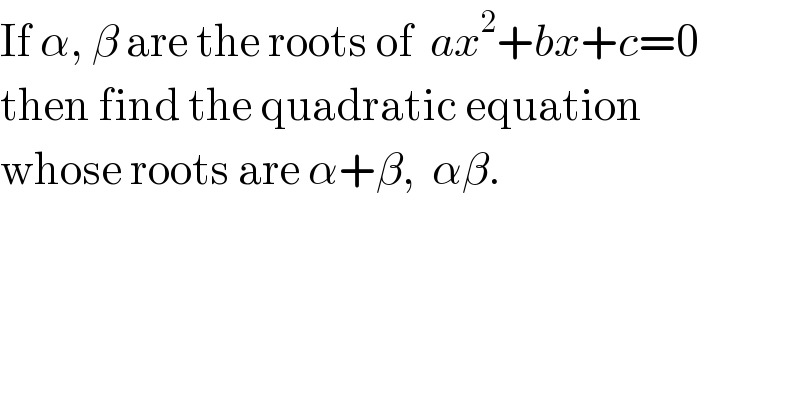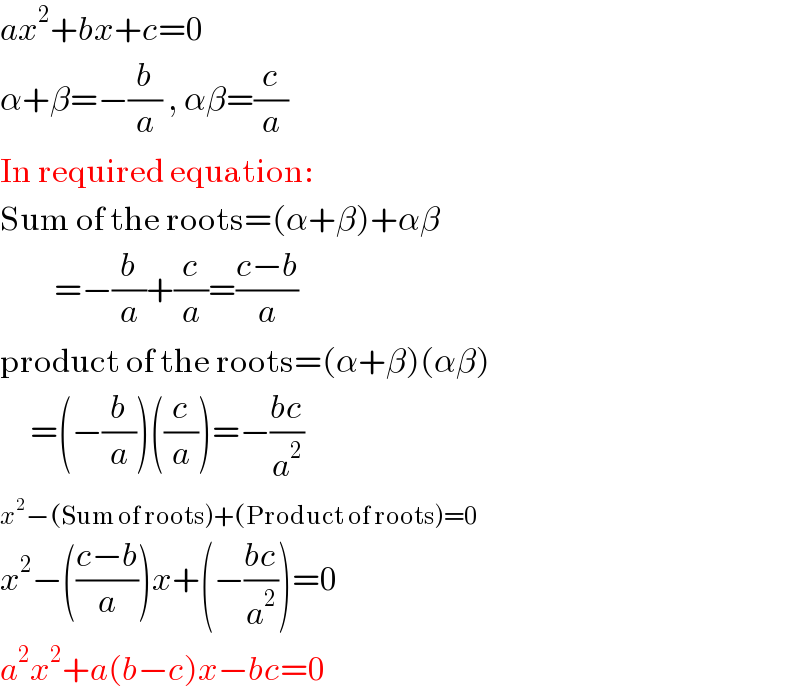
Question Number 26888 by Roshan last updated on 31/Dec/17

$$\mathrm{If}\:\alpha,\:\beta\:\mathrm{are}\:\mathrm{the}\:\mathrm{roots}\:\mathrm{of}\:\:{ax}^{\mathrm{2}} +{bx}+{c}=\mathrm{0} \\ $$$$\mathrm{then}\:\mathrm{find}\:\mathrm{the}\:\mathrm{quadratic}\:\mathrm{equation}\: \\ $$$$\mathrm{whose}\:\mathrm{roots}\:\mathrm{are}\:\alpha+\beta,\:\:\alpha\beta. \\ $$
Answered by Rasheed.Sindhi last updated on 31/Dec/17

$${ax}^{\mathrm{2}} +{bx}+{c}=\mathrm{0} \\ $$$$\alpha+\beta=−\frac{{b}}{{a}}\:,\:\alpha\beta=\frac{{c}}{{a}} \\ $$$$\mathrm{In}\:\mathrm{required}\:\mathrm{equation}: \\ $$$$\mathrm{Sum}\:\mathrm{of}\:\mathrm{the}\:\mathrm{roots}=\left(\alpha+\beta\right)+\alpha\beta \\ $$$$\:\:\:\:\:\:\:\:\:=−\frac{{b}}{{a}}+\frac{{c}}{{a}}=\frac{{c}−{b}}{{a}} \\ $$$$\mathrm{product}\:\mathrm{of}\:\mathrm{the}\:\mathrm{roots}=\left(\alpha+\beta\right)\left(\alpha\beta\right) \\ $$$$\:\:\:\:\:=\left(−\frac{{b}}{{a}}\right)\left(\frac{{c}}{{a}}\right)=−\frac{{bc}}{{a}^{\mathrm{2}} } \\ $$$${x}^{\mathrm{2}} −\left(\mathrm{Sum}\:\mathrm{of}\:\mathrm{roots}\right)+\left(\mathrm{Product}\:\mathrm{of}\:\mathrm{roots}\right)=\mathrm{0} \\ $$$${x}^{\mathrm{2}} −\left(\frac{{c}−{b}}{{a}}\right){x}+\left(−\frac{{bc}}{{a}^{\mathrm{2}} }\right)=\mathrm{0} \\ $$$${a}^{\mathrm{2}} {x}^{\mathrm{2}} +{a}\left({b}−{c}\right){x}−{bc}=\mathrm{0} \\ $$
